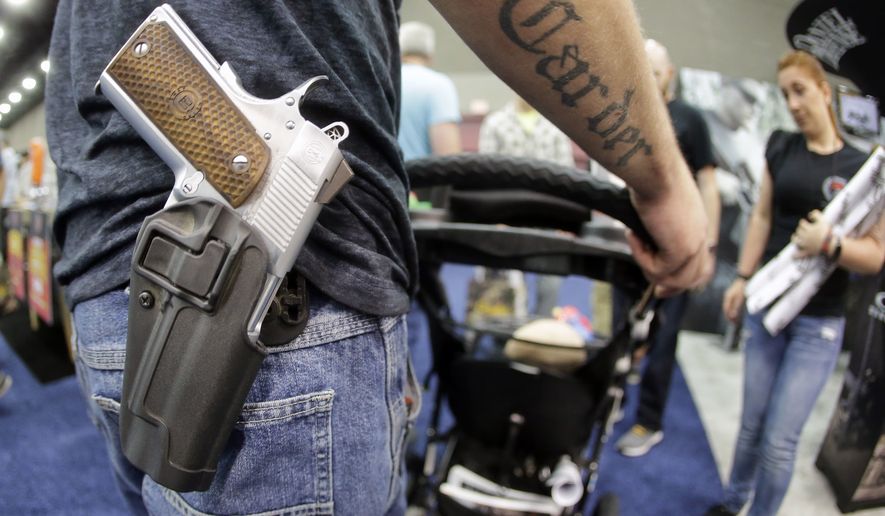LOUISVILLE, Ky. — Riots had broken out when Al Parsons was attending summer school at Louisiana State University soon after the Gun Control Act of 1968 passed, and someone was beating on his apartment door at midnight.
“I looked at my buddy. I said, ’None of my friends are coming this time of night,’” Mr. Parsons said. “He says, ’Mine either.’”
Mr. Parsons, a 67-year-old retiree from Indiana, said he had recently asked his father to purchase a pistol for him — a buy he suspects would now be labeled an illegal “straw purchase.”
“So I picked up that gun and I walked to the front door, and I opened it, and I stick the pistol in the first one’s stomach,” said Mr. Parsons, the former CEO of the Insurance Federation of Minnesota. “I said, ’Can I help you?’ There were three on one side, two on the other, and [he] said, ’Oh, no, we must have the wrong place.’
“Three went one way. Two went the other. I de-cocked it. I slammed the door, loudly, put my gun down,” he said. “Had I not been armed that night, I would have been at least robbed. That’s what was going on. I might have been beaten. I might have been killed.”
Mr. Parsons, recounting his story as he attended the NRA’s annual convention earlier this month, said that was the moment he “became a gun person.”
Stories like his are familiar to NRA members nationwide, who say more guns in the hands of law-abiding folks will make the country safer.
Yet it’s a tough sell to gun control activists, who say more guns is not a solution but rather the root of the problem, contributing to easy access, accidental shootings and a murder rate far out of proportion with peer countries.
The debate has raged for years, with each side drawing on anecdotes.
There is some actual research, but it too does little to clear things up.
A 2013 report from the National Academies’ Institute of Medicine and National Research Council said almost all national survey estimates indicate that “defensive gun uses by victims are at least as common as offensive uses by criminals.” Estimates vary widely, from 500,000 to more than 3 million defensive uses a year, compared to about 300,000 violent gun crimes in 2008.
However, another estimate, cited in a 1997 National Institute of Justice report using National Crime Victimization Survey data, put the number of defensive gun uses at about 108,000 per year, which SUNY Cortland professor Robert Spitzer, the author of “The Politics of Gun Control,” said was closer to the best estimate.
He also said the comparison ignores some of the other dangers from guns.
“The problem with these arguments is that they do not consider what actually happens when more civilians have guns, especially handguns, whether at home or carrying around: more suicides by gun, more accidents and mistakes, more gun thefts, etc. All of these gun-caused injuries and deaths are highly correlated with gun density, especially handgun density,” Mr. Spitzer said in an email.
Mr. Parsons, however, said such accidental cases are rare.
“You’re more likely to go home and slip in your shower and die than you are to have a gun go off and hurt you,” he said.
He also pointed out that he didn’t have to fire a single shot in his situation, and readily admitted his first choice is no conflict at all.
Erich Pratt, executive director of Gun Owners of America, said it’s “very disappointing” when stories like Mr. Parsons’ get downplayed in favor of news about accidental shootings or deaths resulting from gun use.
His group’s website maintains a section devoted to stories of guns used in self-defense.
“There is no doubt the media tries to paint self-defense cases as rare and gun owners as dumb,” he said.
It’s one reason why gun owners are eager to share examples of positive gun use. At the NRA convention, Sen. Rand Paul cited Chris Gaither from Alabama, an 11-year-old who shot and struck a potential burglar.
“It’s not rocket science,” Mr. Paul said. “Though you would think so if you would listen to the gun-grabbers [and] the liberal media. More guns with good guys equals less crime, period.”
Milwaukee County, Wisconsin, Sheriff David Clarke generated some controversy several years ago when he started running radio ads in his home state saying he needed citizens “in the game” on public safety and that with officers laid off and furloughed, “simply calling 911 and waiting is no longer your best option.”
Speaking at the NRA convention, he doubled down on the advice.
“As my public announcements say at the end, you are the first line in your personal defense, not law enforcement,” Mr. Clarke said. “You always have been. But for the last 30 or so years, you have been conditioned away from that duty by having people simply tell you to dial 911.
“That might not be your best option,” he said.
• David Sherfinski can be reached at dsherfinski@washingtontimes.com.




Please read our comment policy before commenting.